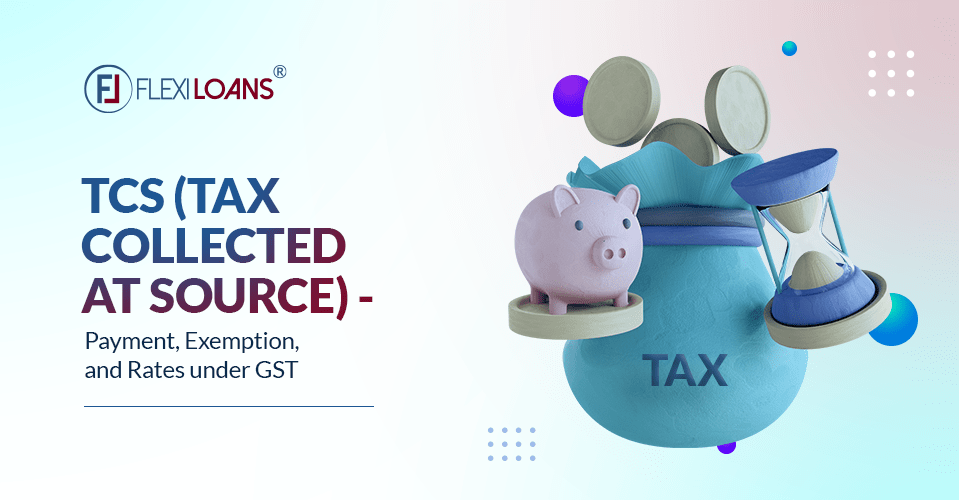Jun 21, 2022
Jun 25, 2025

The tax collected at source (TCS) is usually charged from the buyer by a seller on a specified product/service during the sale. Deposited with the tax authorities, they are ideally business transactions that bear no effect on the common people.
Items taxable under this provision are mentioned in detail under ‘Section 206C’ of the Income Tax Act, 1961.
So, if an individual is buying a new car worth Rs. 20.01 lakhs, they will need to pay Rs. 20,010 as TCS on the sale of goods. The seller will then collect this amount and pay it to the government.
Rather than paying the amount themselves, the sellers act as middlemen, enabling the transaction of the taxed amount between the buyer and government.
This article will help you understand TCS payments and exemptions, alongside the rates applicable to it under GST.
TCS Applicability: Who should pay this tax?
The TCS applicability for businesses is simple.
Whenever a business has a turnover of more than Rs. 10 crores in the previous financial year, with sales consideration of products costing worth Rs. 50 lakhs, sellers need to collect TCS from the buyer.
TCS Rates on Sale of Goods – An Overview
The list below contains a variety of goods liable for taxation when used for trading purposes. Typically, the tax payable is collected during a point of sale.
With that said, the TCS on the sale of goods is mentioned below under different categories:
| Types of Goods or Services | Rate of TCS (%) |
| Alcoholic liquor for human consumption | 1% |
| Tendu leaves | 5% |
| Timber obtained from other methods apart from leased forests | 2.5% |
| Timber obtained from leased forests | 2.5% |
| Forest produce (except Tendu leaves and forest timber) | 2% |
| Parking Lot, Mining and Quarrying and Toll Plaza | 2% |
| Scrap | 1% |
| Iron ore/Lignite/Coal | 1% |
| Motor vehicle purchases exceeding Rs. 10 lakhs | 1% |
| When annual turnover is more than Rs. 10 crores in the previous financial year and sales consideration is more than Rs. 50 lakhs. | 0.1% |
What happens on Non-Payment of TCS?
The seller pays the penalty amount, and the customer will not be charged for payment faults.
In case of delayed or non-payment of TCS, the seller is charged 1% of the total taxable amount.
In cases of non-payment of TCS under the Income-tax Act, they can also be punished with rigorous imprisonment.
Such punishment usually ranges between 3 and 6 months but can extend to 7 years imprisonment with a fine.
Collection and Payments for TCS
- Payments Date for TCS to Government:
The table below represents the dates of TCS payment by the seller to the Government:
| Ending of Quarter | Month of Collection | ITR Due Date | Due Date for Payment |
| June 30 | April May June | July 15 | May 7 June 7 July 7 |
| September 30 | July August September | October 15 | August 7 September 7 October 7 |
| December 31 | October NovemberDecember | January 15 | November 7 December 7 January 7 |
| March 31 | January February March | March 15 | February 7 March 7 April 7 |
- Collection of TCS
Sellers collecting TCS need to apply for a TAN number, which acts as a reference for quotation in TCS returns and also when deposited TCS amount is collected.
The due date for payment of TDS and TCS is the same. Additionally, businesses deducting TCS need to present a TCS return form in the prescribed format.
The form usually contains the type of goods sold, their value/cost and the TCS rate.
Guidelines for Filing Your TCS Returns
One must keep a few things in mind while filing their TCS returns:
- By the end of every month, when TCS is generated, sellers must file the TCS return using Challan 281. It must be completed in 7 days for tax from the previous month.
- Failing to pay the tax collected at source (TCS) on time will lead to the seller being charged 1% of the amount payable. This usually acts as a penalty and will be paid for solely by the seller.
- Tax collectors/sellers must submit their TCS return under Form 27EQ for the total tax collected in a given quarter.
- Upon the successful filing of the TCS return, a certificate or Form 27D is issued.
- In case of delay in paying the tax collected at the source, interest will be charged before filing the Income-tax return.
Exemptions for Tax Collected at Source
There are cases where the buyers can claim exemption on the TCS amount. To do so, they need to furnish a Form 27C. Filling the form, they must claim eligibility for exemption on the TCS amount collected.
A person can claim exemptions on TCS in the following cases:
- The buyer is using the goods for manufacturing and processing-related activities.
- They must not use the goods for commercial trade to be eligible for exemptions.
- Goods are for personal use only.
Buyers need to submit the form and receive its duplicate copy. They must furnish this form alongside the declaration form within 7 days.
Provisions for TCS Rates under GST
Certain provisions regarding the TCS rates were added from October 1, 2018, onwards. They are:
- For all digital transactions, the online sellers would be provided tax after deducting 1% TCS under the Income Tax Act.
- Buyers must be registered under GST.
- The amount must be credited by the 10th of every month to the government.
A few other provisions were also added two years later, in 2020. They are as follows:
- Sellers receiving Rs. 7 lakhs or more in foreign currency under LRS must be collected at 5%.
- Every seller with a gross annual turnover exceeding Rs. 20 crores in the previous financial year to collect tax at 0.1%.
End-note
So this was all about tax collected at source (TCS), its applicability, and exemptions in exceptional cases. We hope this article helped you understand the TCS return filing process better.







